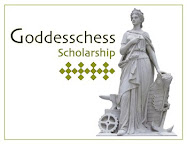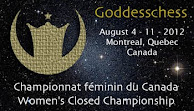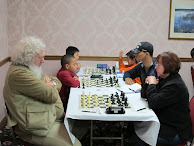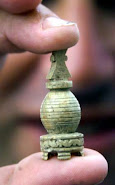Hola darlings! It's Saturday evening and I've been working on an article about the Nishapur chess pieces most of the day - time to take a break!
When I first read this article in Newsweek Magazine in 1999, I was so struck by it that I saved it. The principles it teaches continue to speak to me today: (1) The socialization associated with being a male or female colors our assumptions; (2) those underlying assumptions color our perceptions; (3) those perceptions govern how we interact with others and function in larger society.
The thing is, assumptions can be changed - and once these are changed, our perceptions change too. These principles are key to re-defining the perceptions that males and females have about each other and how we interact with each other - and also key to how females can release themselves from the "trap" of inferior expectations when it comes to chess (and every other area of life).
Newsweek
June 28, 1999
From Both Sides Now
Women do research the same way men do, but the questions they ask nature may be different. Has feminism changed science?
Author: Sharon Begley With Thomas Hayden
Edition:
ATLANTIC EDITION
Section: SocietyPage: 64
One story from the annals of science seems destined to become a minor classic among certain biologists, and it is no coincidence that it concerns sex. Out on the Western plains, biologists were studying herds of mustangs, in which the reigning stallion was believed to have the sole right to procreate. Then a researcher got the bright idea of running DNA tests on the horses. As paternity tests often do, these proved embarrassing: fewer than one third of the herd's foals had been sired by the resident stallions. Instead, mares had snuck over to other herds, mating with males there. Blinded by the "harem" metaphor of mustang social structure, researchers had not even looked for such female behavior.
As such examples accumulate, more and more scholars are wondering whether cultural forces such as feminism affect the direction and results of research. In her new book, "Has Feminism Changed Science?" Penn State historian Londa Schiebinger answers with a definite yes.
"Science is not value-neutral," she argues. "Getting the right answers--turning the crank--may be gender-free. But it is often in setting priorities about what will and what will not be known that gender has an impact."
The claim is inflaming the "science wars," with their battles over whether science is as isolated and objective as partisans claim.
That's the key: it is not that men and women do science differently, but that they choose different questions to pursue, says biologist Patricia Adair Gowaty of the University of Georgia. "The women's movement of the 1960s and 1970s had a huge effect on me," she recalls. "Ideas I was exposed to I have since erected as testable, scientific hypotheses."
One hypothesis involves asking under what circumstances female bluebirds have... well, extramarital affairs. "This is how feminism has changed science," says Gowaty. "I'm not doing the science any differently, but I'm asking a question that has not been asked before."
Gowaty suspects that a female bluebird risks "extra-pair copulations" if she is healthy and a good forager, which would allow her to support her offspring even if her cuckolded mate left. "By answering this question," says Gowaty, "we'll know more about female biology."
And maybe not only the avian kind.
Although most scientists dismiss the idea that there is a female "way of knowing"--holistic, nondominating and cooperative--many recognize that the different experiences men and women bring to the lab lead them to scrutinize different aspects of nature.
Marine biologist Mary Beth Saffo of the University of Arizona was startled when she looked around a 1989 conference on symbiosis--often beneficial relationships between living things, like the little fish that clean parasites off sharks in return for table scraps. "The majority were women," she says. Was it a coincidence? In the '50s and '60s, says Saffo, biologists tried to understand ecosystems "through a framework of antagonism and competition." "There's more interest in and recognition of mutualism now," or cooperative relationships between species.
Although Saffo doesn't go so far as to attribute the shift to feminism, it did coincide with the flood of women into ecology.
Something similar happened in the study of humans' primate relatives. From the 1950s to the 1970s primatologists studied savanna baboons. This species is more aggressive, male-dominated and competitive than any other nonhuman primate. "Most of these scientists were men," says primatologist Linda Fedigan of the University of Alberta. The species they chose, she says, reinforced the notion that male dominance and aggression are the norms of primate behavior, including ours, and that it is the males who bring social cohesion to the troop.
When feminism and women entered the field, in the 1970s, they upended the stereotype of the passive, dependent female, and questioned the idea that male aggression and alliances are the most powerful shapers of primate society. Instead, it turns out that elderly female baboons determine where the troop will forage each day, and a male's reproductive success depends less on his place in the dominance hierarchy than it does on his relationships with the troop's females. And when women began studying primates other than baboons, they found that females actively pursue males and have loads of extramarital affairs--apparently to get more males to provide and care for the babies. Now females are no longer considered peripheral to primate evolution.
Feminism has also changed ideas about how humans evolved from quadrupedal apes to toolmakers, thinkers and talkers. In the 1960s the answer was unquestioned: hunting. The story was that men who learned to cooperate, communicate and make weapons in order to hunt stimulated their brains and drove evolution. Women tagged along and pushed out babies every few years. But female anthropologists now have other ideas. In "Lucy's Legacy," to be published in November, Alison Jolly of Princeton University argues that behavior where females excel (language and forming social bonds) or roles that fall to females (forging links between generations) played the key role in human evolution.
But would these insights have come even if feminism never existed? "Because the changes came so quickly after the feminist critique, they must be at least a bit in response," says Linda Fedigan. But have feminists exaggerated their effect? Schiebinger and others claim that it took feminists to overthrow the dogma about active, heroic sperm pursuing the fat, passive egg, and substituting the now standard view that the egg plays an active role in conception by sending out fingerlike microvilli to reel in a sperm.
Biologist Paul Gross isn't buying it. "The argument about feminism focusing attention upon the egg is absurd and dishonest," he says, because the egg's active role was noted in textbooks even in the 1960s. "If that's all 'feminist science' can claim as an achievement, then it's a joke."
But it does make other claims, in fields from mustang matings to human evolution. If it turns out that the questions science poses, and the answers it seeks, are not walled off from society, maybe that's as it should be.
Remember - the assumptions underlying the question are just as important as the question itself.
Saturday, May 5, 2007
How You Ask the Question May Determine the Answer
Subscribe to:
Post Comments (Atom)



































No comments:
Post a Comment